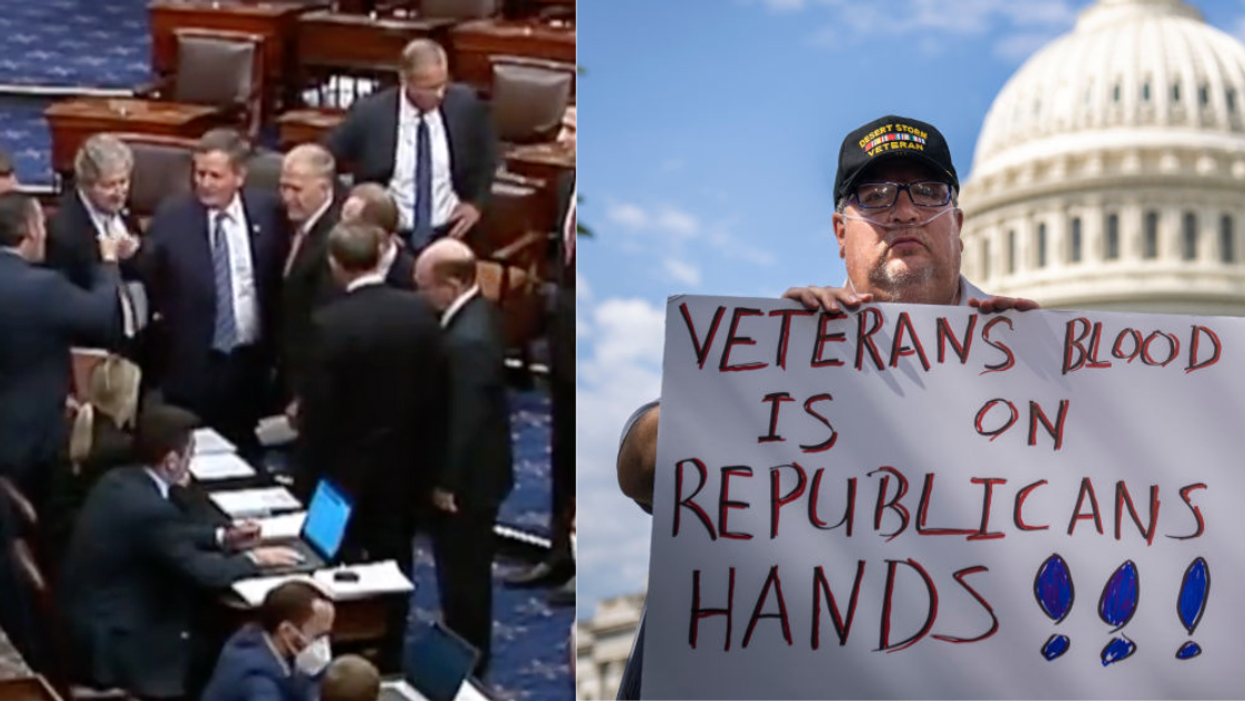You could get whiplash trying to follow Republican “strategy” in the Senate these days.
Days after the GOP celebrated the sinking of the PACT Act, Politico reported that GOP Senators were ready to backtrack on their position.
The Act is a veterans’ health care bill that addresses and funds treatment, in the long term, for military burn pit victims.
Confident that they had the political momentum, Majority Leader Schumer promised to bring the bill up for a second vote in as many weeks.
He allowed up or down votes on amendments proposed by Sen. Pat Toomey (R-PA), but those failed to win a majority of Senators, and the bill sailed through once again and headed to the President’s desk for signature.
It left in its wake many questions.
Chief among them was, why are the Republicans acting like Democrats? That is to say, why were they so disorganized? What happened to the vaunted lockstep GOP opposition?
Senate Republicans had voted overwhelmingly for a nearly identical bill back in June of this year, with 34 of them in favor, only to have 25 of their caucus change their votes at the last minute. Minority Leader Mitch McConnell was tight-lipped, both about the reasons for the initial switch last week and for the later reversal.
“It will pass this week,” he said simply when asked. Other GOP Senate leaders echoed this, with Sen. John Barrasso (R-WY) saying he would “expect it to pass” and Sen. John Thune (R-SD) declaring that at “some point this is going to pass and it will pass big.”
He was right.
It’s a remarkable and embarrassing retreat from when Sen. Ted Cruz was caught on film fist-bumping his colleague, Sen. Steve Daines (R-MT), after 25 Republicans switched their votes and stopped the bill from moving forward. Critics, including veterans groups and comedian-turned-veterans’ health activist Jon Stewart, blasted the abandonment of sick veterans and the callous victory displays by the GOP.
Faced with terrible headlines and even worse optics, not to mention a body blow to the Republican brand of “supporting our troops,” the GOP found itself in chaotic retreat from its disastrous move.
In some ways, this was a long play that the GOP made even worse by its fumble at the end. The original bill had designated the funds that were to be set aside as “mandatory,” rather than discretionary, in something called the “Cost of War Toxic Exposure Fund” within Section 805 of the bill.
Outside of Washington, that designation doesn’t mean much, but inside the Beltway, it was a big deal. It meant effectively that money used for the Fund wouldn’t count against the discretionary budget.
In a worse case scenario for the GOP, overzealous Democrats could allocate more “mandatory” funding that has nothing to do with helping veterans or burn victims. A Congressional Budget Office report flagged this possible issue before the bill was voted on.
This report caused budgetary hawks to sound the alarm.
Warned the Committee for a Responsible Federal Budget on June 14, 2022:
"The Senate is expected to vote on the Honoring our PACT Act this week, which would add at least $277 billion to deficits through 2031 and would increase mandatory spending by up to $667 billion."
"The legislation would expand health and disability benefits to veterans who have (or are presumed to have) been exposed to toxic substances while on their tours of duty and have been diagnosed with health ailments as a result."
"However, the bill itself does not include any offsets to pay for these new benefits, which would cost nearly $300 billion over a decade."
"The bill would also allow policymakers to reclassify nearly $400 billion of projected discretionary spending as mandatory, which would both reduce the pressure to keep those costs under control, and make it easier for appropriators to spend more elsewhere in the budget without offsets."
To be sure, “allowing” policymakers to reclassify hundreds of billions in unrelated random spending and then put it in the Fund would require bad faith by the VA as well as Senate approval, so these warnings were all simply hypothetical. But they scared Sen. Toomey, so he and about a dozen other GOP senators voted against the PACT Act back in June.
Meanwhile, the rest of their 34 Republican colleagues voted for the bill, even with the switch in spending designation. They understood that there wasn’t actually new spending “pork” in the bill; these were just the imaginings of budget hawks.
They were more interested in not looking like they voted against a critical veterans’ health measure than allowing unrealistic hypotheticals to keep them from supporting it.
Here’s where a bit of bad luck and timing happened.
As explained succinctly by veterans’ affairs activist Cory Titus, the bill hit a procedural snag with the House Rules committee. Because of a single line—about how “contract buy outs” under the bill should not be treated as a “taxable benefit”—the whole bill risked being deemed unconstitutional.
Why?
Because tax-related provisions by law have to originate in the House, not the Senate. So rather than make a big deal of this, the House fixed this quickly by simply removing that one provision and then sending it back to the Senate for a mandatory revote, since technically the law had changed and needed approval in its final form by both chambers.
And that’s it. One provision in the whole bill got taken out by the House, and it had nothing to do with the Fund itself or out-of-control spending. It was the same bill as before, minus that part about contract buy outs not being taxable benefits. Everyone, especially the veterans who badly needed the funding, expected it to sail through, just as it had before.
So what happened?
Well, that depends on who you believe. The Republicans claimed that they voted it down to prevent out-of-control spending that Schumer had snuck into the bill as a “budgetary trick.” That talking point got repeated by Sen. Ted Cruz and across Fox News and other right-wing media, and that’s what Republican voters were misled to believe.
The problem with this argument, as Stewart and others easily pointed out, was that it was a lie.
The bill had no new provisions, no new pork, from the prior version that had won support from 34 GOP Senators. These Senators knew about the mandatory funding provision when they voted on the bill in June, and they simply didn’t care that much at the time.
What had changed was the surprise announcement by Schumer and Manchin that a climate, healthcare, and tax deal on the budget had been reached between them after all, and that it was going to move forward as the last action by the Senate before the recess.
McConnell earlier had threatened to torpedo an unrelated but very important bill to provide critical support for American semiconductor manufacturing, were a budget bill to be put on the table. Schumer and Manchin met in secret, however, and after the CHIPS passed with bipartisan support, they sprang their bill.
This clearly infuriated Republicans and deeply humiliated McConnell. The GOP wanted revenge, and so in a fit of tantrum 25 of them voted against the PACT Act that they had just voted for the month before.
Sen. Susan Collins (R-ME) added to the sense that Republicans were acting out of spite when she warned that the budget bill could torpedo GOP support for efforts to codify same-sex marriage into law.
This seemed only to reconfirm to many that today’s Republicans don’t vote out of any kind of principle, but rather only for political purposes, and that they are completely willing to throw veterans and millions of gay families under the bus if they don’t get their way.
The GOP apparently has now accepted that the whole PACT Act reversal was a huge mistake, and they were willing to take their losses and pass the bill after all. McConnell would surely sooner put the embarrassing defeat behind him.
Should the budget bill he and other GOP leaders are now fighting actually pass before recess, however, McConnell will look even more ineffectual and weak in the eyes of his fellow Senators.
Disarray, indeed.













 @TweetforAnnaNAFO/X
@TweetforAnnaNAFO/X

 Steve Urkel Oops GIF
Steve Urkel Oops GIF  Moon Walk Dance GIF
Moon Walk Dance GIF  The Office Monday GIF by 20th Century Fox Home Entertainment
The Office Monday GIF by 20th Century Fox Home Entertainment 